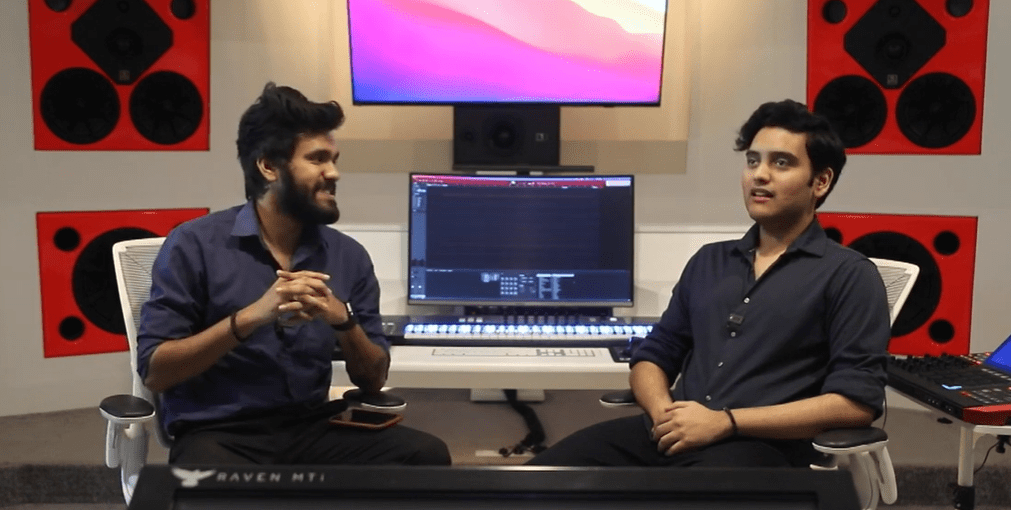Samuel Nicholas Harris, better known as the son of renowned composer Harris Jayaraj, has been a major addition to the Tamil music scene in recent months. Samuel, however, is making an effort to reshape his own path—purposefully, boldly, and remarkably effectively—in contrast to others who inherit legacies. Aiyaiyo, his debut single, stands out in a scene still primarily dominated by film-based compositions and offers a novel perspective on Tamil independent music.
Samuel has made a daring move that says volumes by releasing his first single on his own. He’s not walking through studio doors that have already been opened for him, nor is he merely depending on his father’s illustrious past. Rather, one chorus, one beat, and one vulnerable lyric at a time, he is writing his own story. The end effect is a song that feels remarkably like youth itself: restless, avant-garde, and full of a spirit that begs to be heard.
Aiyaiyo became an unplanned anthem among young listeners after going viral on Tamil YouTube channels and Instagram reels. Its fusion of catchy vocal layering and rhythmic freshness demonstrates an awareness of both conventional musical structures and the needs of an audience that is accustomed to digital media. This balance is extremely challenging for up-and-coming musicians, especially those from legendary families. However, Samuel appears to have done so, albeit with noticeably more nuance.
Biography of Samuel Nicholas Harris
| Category | Details |
|---|---|
| Full Name | Samuel Nicholas Harris |
| Parents | Harris Jayaraj (Father), Suma Jayaraj (Mother) |
| Sibling | Karen Nikitha Harris (Sister, Playback Singer) |
| Year of Birth | Circa 2001 (Age approx. 23 as of 2025) |
| Profession | Independent Musician, Composer, Vocalist |
| Debut Work | Independent Single: Aiyaiyo |
| Notable Achievements | Viral debut, praised for composition and performance |
| Education | Not Publicly Disclosed |
| Instagram Handle | @samuelnicholasharris |
| Public Appearances | Interviews with The Hindu, Cinemavikatan, Instagram Reels |

Samuel’s ascent is not without parallels. Children of famous artists are scrutinized in India and even abroad for their methods as well as their work. Similar to Shruti Haasan in Indian cinema or Lily Allen or Jakob Dylan overseas, these artists have names that carry implicit pressure. Samuel has made a particularly creative choice by opting to release an independent single rather than dive straight into film scoring; this choice disassociates him from claims of entitlement and instead emphasizes a genuine, natural musical process.
Interviews and online discussions have brought attention to his strategy in recent days. Samuel spoke openly about nepotism in an interview with The Hindu. In addition to highlighting the fact that respect in the field must be earned rather than inherited, he took ownership of the privilege rather than evade it. This degree of self-awareness is very evident and frees his work from the needless burden of continual comparison.
Samuel has established a direct line of communication with his audience by utilizing social media sites like YouTube and Instagram. His approach circumvents conventional studio-supported marketing and allows for unfiltered feedback, including both positive and negative comments. By using this strategy, he can reach a fan base that is more emotionally invested, digital native, and especially devoted to authenticity.
Aiyaiyo’s emotional core is what many find so captivating. The lyrics have a straightforwardness that feels surprisingly honest. The emotional tone of this debut is unexpected, light, and surprisingly affordable, which feels refreshing on a humid day when a lot of Tamil music is either overly cinematic or artificially commercial.
This young debut is the result of decades of musical brilliance in the family. With roles in movies like Minnale, Ghajini, and Vaaranam Aayiram, Harris Jayaraj has taken home almost all of South India’s major music honors. Though never intrusive, his impact on Tamil cinema has been significant. The most anxious moment of Samuel’s life, he remembers, was presenting his father with the first draft of Aiyaiyo. How did his father respond? After a brief nod, the words “improve the next one” are spoken. Samuel’s discipline and humility have clearly been influenced by that subdued expectation—disguised encouragement.
Karen Nikitha Harris, his sister, has also entered the music industry. She won a V4U Media award for her vocals in the movie Kaappaan. This suggests a family culture centered on hard-won talent and creative output. However, both siblings seem dedicated to letting their work speak for itself, even though they share a last name.
Samuel is at the perfect moment. There has been a sort of rebirth of Tamil independent music in recent years. There is a huge demand for music from non-movies that still has cultural and emotional significance, as demonstrated by performers like Dhee, Arivu, and Sean Roldan. In this regard, Samuel’s debut is incredibly effective in terms of timing, market positioning, and production quality.
The risk of going solo cannot be ignored, even though the music industry disputes whether sons and daughters of celebrities have it easier. There are innumerable others who fall victim to their family’s legacy for every breakthrough success. Samuel appears to be conscious of this fine line. Instead of copying his father’s orchestral majesty, he is gravitating toward experimentation, clarity, and simplicity.
It’s unclear what he will do next, but if Aiyaiyo is any guide, Samuel Nicholas Harris is determined to deserve his fame. He seems to be creating a musical identity that is remarkably adaptable and unrestricted by industry standards, regardless of whether he decides to work with independent labels, partner with streaming services, or even go into film scoring in the future.

